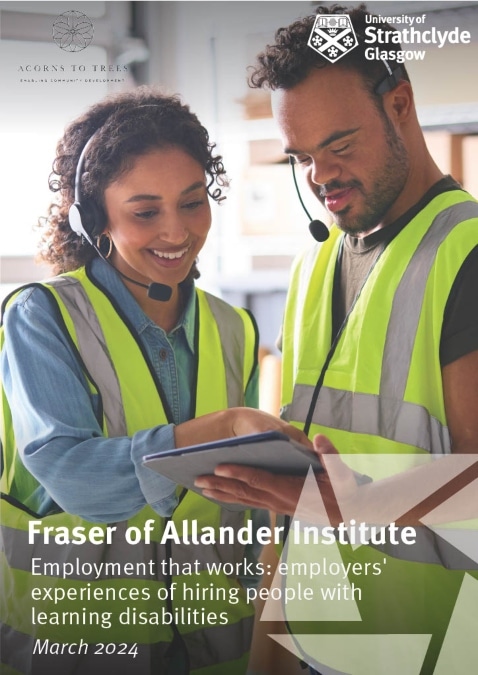This report features our findings from speaking to seven employers with experience hiring people with learning disabilities. We summarise what they told us about what works for each employer and reflect on common challenges that employers told us they face. The key findings are summarised below.
Some highlights from what works:
- The Theatre Royal told us that small changes can make a big difference, such as extended induction periods, accessible rotas and help with online training modules.
- At RSBi, they told us that courses in numeracy and literacy were enabling people with learning disabilities to transition from supported employment to mainstream employment.
- Employees’ roles at the Usual Place highlighted positions of mentorship that are available to people with learning disabilities.
- Our contact at DFN Project SEARCH emphasised the need for equitable recruitment.
- Renfrewshire Council were creating a talent pipeline for people with learning disabilities so that they could become full-time permanent employees at the Council.
- Volvo Motherwell sang the praises of North Lanarkshire Council’s supported employment scheme.
- The Assembly told us about their model where people with learning disabilities become paid advocates and leaders for other people with learning disabilities.
The key challenges we found include:
- Difficulties measuring the number of employees with learning disabilities. This is important for tracking workforce diversity, but some people with learning disabilities won’t want to
disclose or be labelled as such. A short-term solution to this may be to measure support provided instead. - Challenges that arise when people with learning disabilities and autism are viewed as one group in policy and other areas. We heard contrasting views from employers about the types
of work suited to people with learning disabilities and autism. Aggregating groups that aren’t sufficiently similar could lead to one group’s needs being overshadowed by the other. - The importance of ‘enablers’ who champion inclusion and promote culture change. Culture change could be trickier for larger employers.
- Challenges with Access to Work. We heard that Access to Work is great once in place, but has long waiting times for support and applying can be a stressful process for both employers and
employees. - Barriers of expectation. We heard from some employers that both people with learning disabilities and their parents can find the transition into work difficult when they have been
told that they may not work. Some employers are working to tackle this with school-age young people so that they and their families feel prepared for entering the workplace.
Our next piece of work will involve employers who haven’t yet hired people with learning disabilities to better understand perceived barriers for employers.
Authors
Chirsty is a Knowledge Exchange Associate at the Fraser of Allander Institute where she primarily works on projects related to employment and inequality.
Emma Congreve is Principal Knowledge Exchange Fellow and Deputy Director at the Fraser of Allander Institute. Emma's work at the Institute is focussed on policy analysis, covering a wide range of areas of social and economic policy. Emma is an experienced economist and has previously held roles as a senior economist at the Joseph Rowntree Foundation and as an economic adviser within the Scottish Government.


